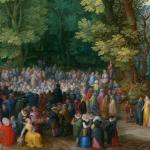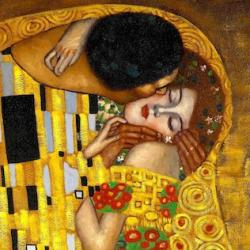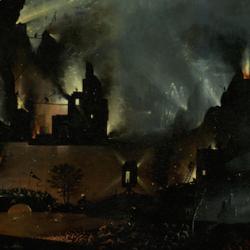An old piece, first published in Touchstone magazine.
Contemporary horror films have nothing on Dante. His Inferno is full of terrors that even the most jaded film-maker would shrink from putting on screen: Nightmarish landscapes flowing with streams of boiling blood, deserts of burning sand showered by fire from Heaven, pits and rivers of black pitch, excrement, and muck, a lake eternally frozen that holds Satan, eternally munching on his victims. Noxious smells and putrid fogs fill the air, and as Dante descends toward the center of the earth, light is swallowed in utter blackness.
And this landscape is teeming with people shrieking in despair and pain, so many that Dante says in amazement, “I wondered/ how death could have undone so great a number” (Inferno 3.56–57). The punishments are terrible: Some are upside down in pits, others are enclosed in flames; some have had their heads twisted so that they face backward as they walk, others are tormented by sadistic demons; some are split from chin to belly, their guts and organs hanging between their legs, and others are chased by ferocious dogs that tear off pieces of flesh; some are transformed into serpents again and again, while others are plagued by disease.
Punishments in Hell are often inflicted by other human beings. The place is full of petty squabbles, foolish arguments, infantile fistfights, hair-pulling, head-butting. Near the bottom of the pit of Hell, Dante comes upon Ugolino, who plotted with Archbishop Ruggieri to take over the government of Pisa. When the archbishop turned against him, Ugolino was imprisoned in a tower with his sons and grandsons and left to starve. He watched as his children died “one by one.”
Dante leaves the final act unspoken, but he says enough: “by then gone blind, groped over their dead bodies./ Though they were dead, two days I called their names./ Then hunger proved more powerful than grief ” (Inferno 32.73–76). When Dante finds the count in Hell, he is frozen together with the archbishop and is gnawing on the archbishop’s head:
As a man with hungry teeth tears into bread,
the soul with capping head had sunk his teeth
into the other’s neck, just beneath the skull.Tydeus in his fury did not gnaw
the head of Menalippus with more relish
than this one chewed that head of meat and bones. (Inferno 32.127–132)
Before he can speak to Dante, Ugolino “first wiped off his messy lips/ in the hair remaining on the chewed-up skull” (Inferno 33.1–3).
By comparison with Dante, Stephen King is as tame as A. A. Milne.
Though Dante rivals and surpasses modern horror, his vision of the world of the damned is set in an explicitly Christian context. The violence and terror are not gratuitous or titillating. They are shown because they teach us about God, the God whom Dante confesses as Eternal Love. As he approaches the gate of Hell, Dante reads the famous inscription:
I am the way to the doleful city,
I am the way into eternal grief,
I am the way to a forsaken race.Justice it was that moved my great Creator;
Divine omnipotence created me,
and highest wisdom joined with primal love.Before me nothing but eternal things
were made, and I shall last eternal.
Abandon every hope, all you who enter. (Inferno 3.1–9)
For all its horror, Hell does not only reveal God’s justice and wisdom. It is also a creation of the Father’s power, the Son’s wisdom, and the Spirit’s love.
To moderns, this sounds preposterous. How could love construct a place where one man eats the brains of another? In this reaction, modern readers are not alone. Dante asks himself similar questions many times during his journey through Hell, and he reacts to the punishments he witnesses with horror and pity.
Unlike moderns, however, Dante believed that if Hell made no sense to him, the flaw must be in him, not in Hell itself, much less in God. If he cannot yet see justice and love at work in Ugolino, it is because he has not learned to see properly. He does not begin with a proper understanding of love; he must undergo an ascent to love, an ascent that requires renewed vision and an ascent that begins with a descent. And this is one of the ways that Hell is a construction of primal love—because it reveals by way of contrast the nature of love.
Continue reading here.












